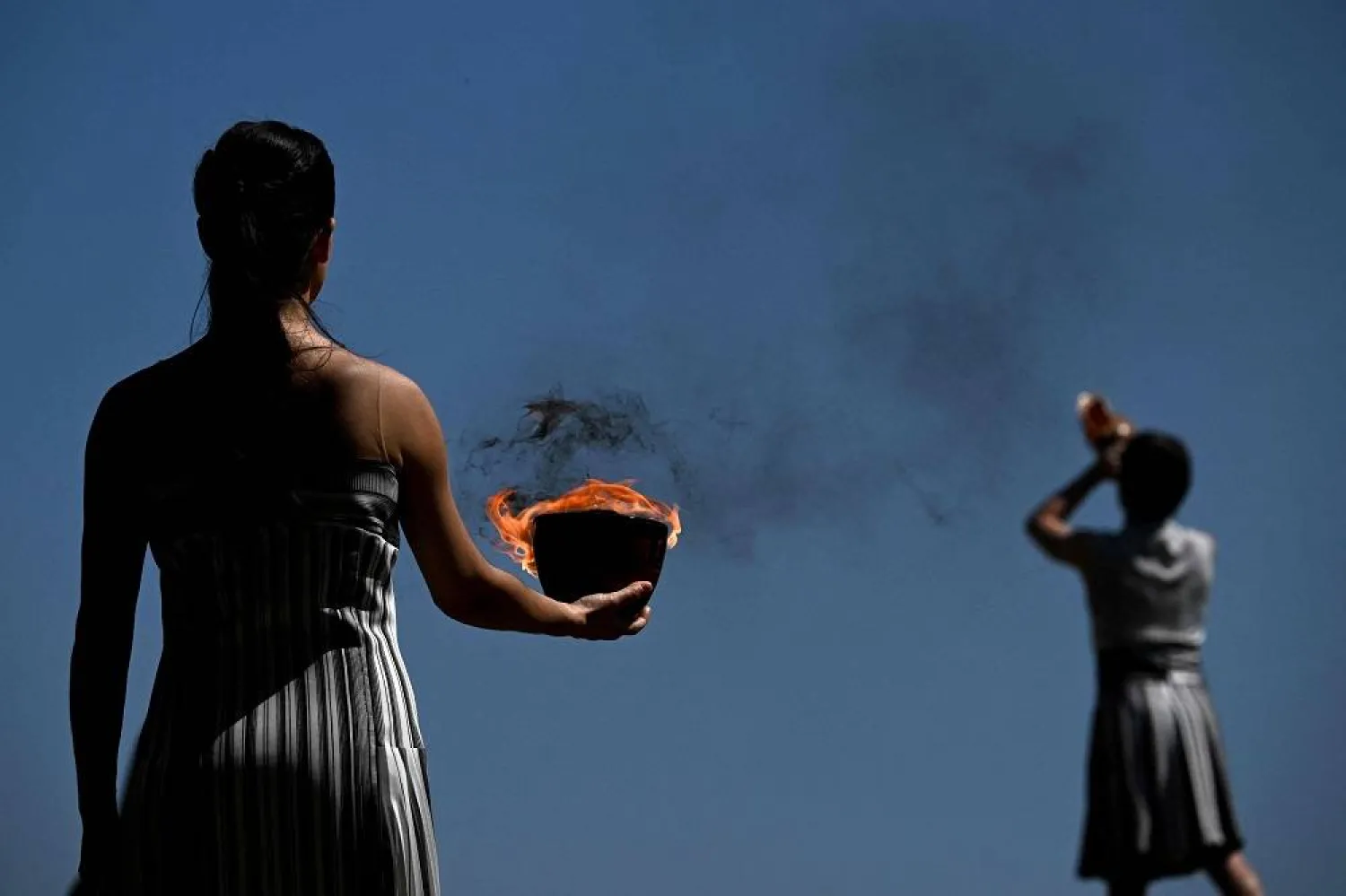No one knows what music in ancient Greece sounded like or how dancers once moved.
Every two years, a new interpretation of the ancient performance gets a global audience. It takes place in southern Greece at the birthplace of the Olympic Games.
Forty-eight performers, chosen in part for their resemblance to youths in antiquity as seen in statues and other surviving artwork, will take part Tuesday in the flame-lighting ceremony for the Paris Olympics.
Details of the 30-minute performance are fine-tuned — and kept secret — right up until a public rehearsal Monday.
The Associated Press got rare access to rehearsals that took place during weekends, mostly at an Olympic indoor cycling track in Athens.
As riders whiz around them on the banked cycling oval, the all-volunteer Olympic performers snatch poses from ancient vases. Sequences are repeated and re-repeated under the direction of the hyper-focused head choreographer Artemis Ignatiou.
“In ancient times there was no Olympic flame ceremony,” Ignatiou said during a recent practice session.
“My inspiration comes from temple pediments, from images on vases, because there is nothing that has been preserved — no movement, no dance — from antiquity,” she said. “So basically, what we are doing is joining up those images. Everything in between comes from us.”
Ceremonies take place at Olympia every two years for the Winter and Summer Games, with the sun’s rays focused on the inside of a parabolic mirror to produce the Olympic flame and start the torch relay to the host city.
Women dressed as priestesses are at the heart of the ceremony, first held for the 1936 Olympics in Berlin. Leading the group is an actress who performs the role of high priestess and makes a dramatic appeal to Apollo, the ancient god of the sun, for assistance moments before the torch is lit.
Over the decades, new ingredients have been progressively added: music, choreography, new colors for the costumes, male performers known as “kouroi” and subtle style inclusions to give a nod to the culture of the Olympic host nation.
Adding complexity also has introduced controversy, inevitably amplified by social media. Criticism this year has centered on the dresses and tunics to be worn by the performers, styled to resemble ancient Greek columns. Faultfinders have called it a rude departure from the ceremony’s customary elegance.
Organizers hope the attire will create a more positive impression when witnessed at the ruins of ancient Olympia.
Counting out the sequences, Ignatiou controls the music with taps on her cell phone while keeping track of the male dancers at the velodrome working on a stop motion-like routine and women who glide past them like a slowly uncoiling spring.
Ignatiou has been involved with the ceremony for 36 years, as priestess, high priestess, assistant and then head choreographer since 2008. She takes in the criticism with composure.
She’s still moved to tears when describing the flame lighting, but defers to her dancers to describe their experience of the five-month participation at practices.
Most in their early twenties, the performers are selected from dance and drama academies with an eye on maintaining an athletic look and classic Greek aesthetic, the women with hair pulled back in neat double-braids.
Christiana Katsimpraki, a 23-year-old drama school student who is taking part at Olympia for the first time, said she wants to repay the kindness shown to her by older performers.
“Before I go to bed, when I close my eyes, I go through the whole choreography — a run through — to make sure I have all the steps memorized and that they’re in the right order,” she said. “It’s so that the next time I can come to the rehearsal, it all goes correctly and no one gets tired.”
The ceremony is performed to sparse music, and final routine modifications are made at Olympia, in part to cope with the pockmarked and uneven ground at the site.
Dancers describe the fun they have in messaging groups, the good-natured pranks played on newcomers and fun they have on the four-hour bus ride to the ancient site in southern Greece — but also the significance of the moment and the pull of the past.
“I’m in awe that we’re going there and that I’m going to be part of this whole team,” 23-year-old performer Kallia Vouidaski said. “I’m going to have this entire experience that I watched when I was little on TV. I would say, ’Oh! How cool would it be if I could do this at some point.’ And I did it.”
The flame-lighting ceremony will start at 0830 GMT Tuesday. A separate flame-handover ceremony to the Paris 2024 organizing committee will be held in Athens on April 26.









